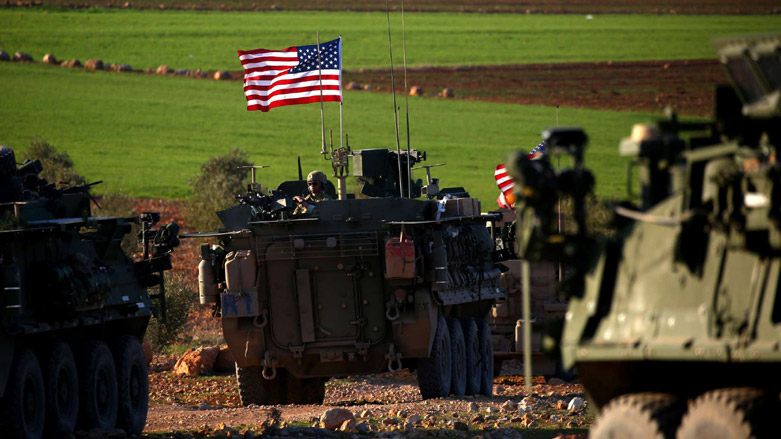Trump suspends US funds for Syrian reconstruction: What’s going on?

WASHINGTON DC, United States (Kurdistan 24) – On Friday, US officials revealed that President Donald Trump had ordered the State Department to suspend over $200 million for assistance in Syria—humanitarian aid, as well as reconstruction funds.
That decision follows Trump’s statement on Thursday, when he spoke in Ohio about his plans to rebuild US infrastructure and seemed to engage in a boastful digression, proclaiming that the Islamic State (IS) had been defeated and US forces would be leaving Syria “very soon.”
Two months ago, US officials laid out a quite different plan. US troops would remain in Syria after IS’ defeat, with a three-fold objective: block Iran; prevent IS’ reemergence; and use the US presence as a bargaining chip over Syria’s political future.
The new policy surprised, and angered, Turkey and Russia, each for its own reasons. Moscow gave Ankara a green light to attack the Kurdish enclave of Afrin, where it controlled the skies. Turkey’s offensive began Jan 20, resulting in its occupation of Afrin two months later.
Trump’s announcement of his intent to leave Syria is the opposite of that policy and caught virtually all but the most senior US officials “off guard,” as ABC News reported.
IS is not yet defeated in Syria, where it retains a presence in the Middle Euphrates River Valley, from Deir ez-Zor east to the Iraqi border. A hasty US withdrawal risks IS’ reemergence.
A quick US departure would also give Iran and Russia virtually uncontested dominance in Syria and threaten key US allies.
Chagai Tzuriel, director general of Israel’s Ministry of Intelligence, told Washington Post columnist, Josh Rogin, that if the US really intends to block Iranian expansionism—a stated objective of the Trump White House—it must do so, above all, in Syria.
Riyadh shares the Israeli view. Since meeting Trump 10 days ago, Saudi Crown Prince, Mohammed bin Salman has been touring the US. Bin Salman spoke with Time magazine shortly after Trump’s Ohio speech and expressed his dissatisfaction.
“We believe American troops should stay [in Syria] for at least the mid-term, if not the long-term,” bin Salman said.
Although many may feel that almost anything is possible in Trump’s unorthodox presidency, it is a bit difficult to see the US abruptly leaving Syria, if Iran will be a major beneficiary of the ensuing power vacuum.
Could there be something else behind Trump’s surprising, new stance on Syria. Maybe, he is articulating a tough negotiating position? Possibly, he wants other countries to contribute much more to Syrian reconstruction—particularly a country like Saudi Arabia, which he sees as rich, and which benefits directly from US efforts.
Trump has done similar things before. On March 1, he announced stiff, new tariffs on imported aluminum and steel. Stock markets plunged, as investors panicked about a trade war.
However, the panic passed, as Trump’s move, mostly, has served as a vehicle for gaining trade concessions from other countries.
Not so long ago, some worried that Trump would go to war with “rocket-man”—his appellation for the leader of North Korea. But now, after the US and North Korean presidents traded the most grotesque and demeaning insults, and a lot of other tough talks, Trump is about to become the first US president to meet a North Korean leader!
So, perhaps, a similar outcome will follow Trump’s statements on Syria. Kurds, and their friends, however, should beware that close US-Saudi ties are not necessarily in Kurdish interests.
Ties between Washington and Riyadh are unusually warm, having recovered from the strains following the 9/11 attacks. No recent US president has been as close to the Saudis as Trump.
The relationship grew out of an encounter between Trump’s son-in-law, Jared Kushner, and bin Salman last March, when a spring snowstorm caused the cancellation of a presidential lunch with German Chancellor, Angela Merkel.
Bin Salman chanced to be in Washington and was invited instead. He and Kushner bonded, and Kushner then prevailed on his father-in-law to make Riyadh the destination of his first presidential trip abroad—over the objections of Secretary of Defense, Jim Mattis, and Secretary of State, Rex Tillerson.
Among other things, it seems that Bin Salman promised to repair ties between Sunni Saudi Arabia and Shia Iraq and bring Baghdad back to the “Arab fold”—pulling it away from Iran.
In the background was the prospect of money from the oil-rich Gulf Arab states for Iraqi (and Syrian) reconstruction. In short, it seems that bin Salman volunteered to help Trump resolve some very big problems.
The premise of that effort was “one-Iraq,” with Kurds subordinated to Arabs.
However, as could have been anticipated, it is not working so well. Iran is an ancient empire and, at times in its long history, a center of civilization and international power. Saudi Arabia is a newbie country, its leaders’ perspectives rooted in Arab tribal culture. Between one and the other, there is no contest.
